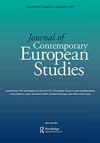“纯粹的波兰人民”和“欧洲精英”——民粹主义和欧洲怀疑主义在波兰政治中是如何相互作用的?
IF 1.8
3区 社会学
Q1 AREA STUDIES
引用次数: 0
摘要
摘要欧洲怀疑论与民粹主义政治行动者、话语和议程之间存在显著的相关性。自2015年以来,波兰与欧盟委员会之间关于法治的持续冲突使欧洲一体化成为波兰政治的中心。本文的主要焦点是民粹主义和欧洲怀疑主义之间的关系和相互作用,通过波兰政党的例子进行分析。为此,本文调查了波兰民粹主义右翼政党对欧盟的不同形式的争论,并评估了这些争论通过民粹主义话语表达的程度。我们发现波兰政党的民粹主义和欧洲怀疑态度之间存在很强的相关性。随着越来越多的民粹主义政党进入主流,“非公民社会”行为者转变为政党,反精英主义话语产生了在国家权力结构之外定位“腐败精英”的需要。关键词:民粹主义、欧洲怀疑主义、政党、波兰、非公民社会披露声明作者未报告潜在的利益冲突。本章是作者在欧盟地平线2020研究和创新计划项目中工作的结果,资助协议编号822682。它仅反映了作者的观点,原子能机构对其所载资料的任何使用概不负责。后来的事件,如白俄罗斯边境危机和乌克兰战争,进一步影响了对波兰在欧洲地位的叙述,但不在本研究所涵盖的时间范围内。本研究得到了地平线2020[822682]的支持。本文章由计算机程序翻译,如有差异,请以英文原文为准。
The ‘pure polish people’ vs the ‘European elite’ – how do populism and Euroscepticism interact in Polish politics?
ABSTRACTThere is a notable correlation between Eurosceptic and populist political actors, discourses and agendas across Europe. Since 2015, the ongoing conflict between Poland and the European Commission concerning the rule of law has brought European integration to the centre of Polish politics. The main focus of this article is on the relationship and interaction between populism and Euroscepticism, as analysed through the example of Polish political parties. To this end, the article investigates the different forms of EU contestation by Polish populist right-wing parties and assesses the extent to which these are expressed through populist discourse. We find a strong correlation between populist and Eurosceptic attitudes of Polish political parties. With the growing number of populist parties entering the mainstream and ‘uncivil society’ actors transforming into political parties, the anti-elitist discourse generates a need to locate the ‘corrupted elites’ outside of the national power structures.KEYWORDS: PopulismEuroscepticismpolitical partiesPolanduncivil society Disclosure statementNo potential conflict of interest was reported by the author(s).Notes1. The chapter is the result of the authors work within the project of the European Union’s Horizon 2020 research and innovation programme under grant agreement No. 822682. It reflects only the authors view and the Agency is not responsible for any use that may be made of the information it contains.2. Later events, such as the Belarusian border crisis and the war in Ukraine, have further impacted the narratives on Poland’s place in Europe, but fall outside of the timeframe covered in this study.Additional informationFundingThe work was supported by the Horizon 2020 [822682].
求助全文
通过发布文献求助,成功后即可免费获取论文全文。
去求助
来源期刊

Journal of Contemporary European Studies
Multiple-
CiteScore
2.70
自引率
7.70%
发文量
84
期刊介绍:
The Journal of Contemporary European Studies (previously Journal of European Area Studies) seeks to provide a forum for interdisciplinary debate about the theory and practice of area studies as well as for empirical studies of European societies, politics and cultures. The central area focus of the journal is European in its broadest geographical definition. However, the examination of European "areas" and themes are enhanced as a matter of editorial policy by non-European perspectives. The Journal intends to attract the interest of both cross-national and single-country specialists in European studies and to counteract the worst features of Eurocentrism with coverage of non-European views on European themes.
 求助内容:
求助内容: 应助结果提醒方式:
应助结果提醒方式:


